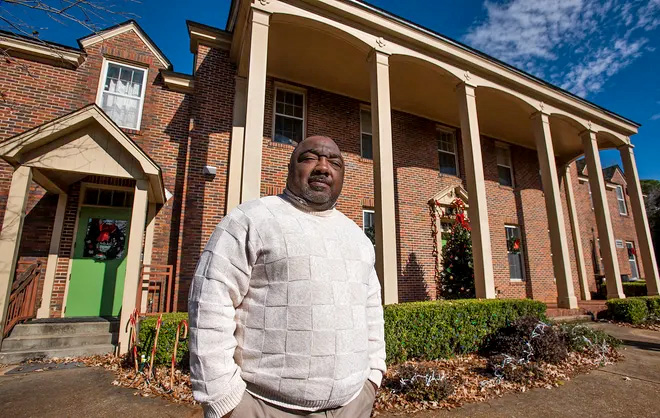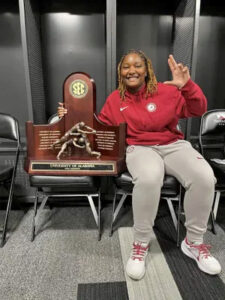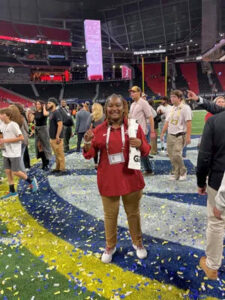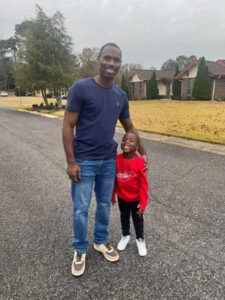Growing up in foster care, building a better life:
Stories from Brantwood Children’s Home
At the end of a winding drive lined with gingerbread men, beside a sprawling cemetery, atop a hill in Montgomery sits a red brick house. Behind its six columns wrapped in twinkle lights, 18 tall windows covered by wreaths and a sturdy green door, there are 26 children.
They are among the nearly 6,000 foster children living in Alabama.
Aged 10-21, most kids at Brantwood Children’s Home cope with trauma of some kind. For one reason or another, they have ended up in the custody of the Alabama Department of Human Resources.
Some have bounced around to state-contracted facilities since they were babies, and some grew up in households filled with abuse and neglect. This could be the first place they’ve lived where an adult is truly looking out for them, where their guardians are actively contributing to their long-term wellbeing.
“We’re just trying to normalize their childhoods,” executive director and former Community Hero Gerald Jones said. “A lot of our kids, they’re survivors.”
29 years, 1,000 kids and counting
Jones started working at Brantwood in the 90s as a house parent on the boy’s hall. Essentially, his job was to take care of the boys when they weren’t in school.

At just 25 years old, he took the job lightly at first, simply making sure the boys completed their assigned chores, did their homework and got along. It didn’t take long, though, before he realized the gravity of what his work meant to these kids. He had to be a role model, a father figure, a friend and a confidant.
Jones remembers the moment.
It was one boy’s 16th birthday, and the entire house decided to surprise him with a cake and a celebration after dinner. While everyone sang “Happy Birthday,” the six-foot-something young man towered over the room with a frown on his face. Once the song ended, he lashed out, cursing at staff members and storming away.
Jones stood there befuddled, thinking, “What more could he have wanted from us?”
Later that night, he went to check on the boy. When Jones opened the bedroom door, he was sitting on his bed sobbing. The boy looked up and said through tears, “She never called.”
“He goes from this big, intimidating teenager to a baby. He didn’t get a phone call from his mom on his 16th birthday, and that was the only thing he wanted,” Jones said. “That was so significant for me because sometimes we just don’t get it. We don’t know what they’ve been through, and it’s not about us.”
Twenty-nine years and over 1,000 Brantwood residents later, Jones still takes that memory with him. It helps him empathize with every misbehaving child he comes across in the foster system.
“You see so much of the trauma and the tragedy that it’s hard when you’re just starting out in the profession. You don’t know if you’re actually doing any good,” Jones said. “But I’ve seen enough on the other end. I’ve been to graduations, gotten calls from kids who are having babies, received enough wedding invitations to see the joy in them. They’re going to be alright, and their kids are not going to be at Brantwood.”
What it’s like to leave the foster system
When staff members at Brantwood talk about kids who grew up there, their pride is nearly palpable. This may be because they aren’t legally allowed to share the kids’ sucesses until they age out of the system.
For example, former resident Dataysha Thomas graduated from then-Lee High School as the 2020 salutatorian after four years as a star basketball player. Brantwood couldn’t share that information at the time it was happening.

Now, Thomas is in her senior year at the University of Alabama, majoring in athletic training and working with Alabama football. She’s even traveling to Pasadena, Calif., with the team for the Rose Bowl on New Year’s Day. Jones and the Brantwood staff are overjoyed for her.
“They’re people who actually care and want more for you,” Thomas said.
She entered the foster system at age 13, along with her four siblings. For the first eight months, she didn’t stay anywhere for longer than a few weeks. Nothing was the right fit, and she felt like she was being forced “to join a new family.” She didn’t want that. She just wanted her own.
Then she landed at Brantwood with two of her brothers.
“I was definitely nervous, but over time, everything got better. Mr. Gerald, he was always telling me how smart I was and that I could do anything I wanted to,” Thomas said. “Being there showed me that this is the correct way for us to be loved.”

Thomas never thought college would be a possibility for her. Then, she graduated at the top of her high school class, and her ride to UA became a reality.
When it came time to leave Brantwood, she wasn’t scared. She knew she would keep in touch with the people she cared about, and she was excited for her future.
“That’s exactly what we want to see,” Jones said.
‘I didn’t want him to go through foster care’
Another person Jones points to as a success story is Dentriel Thomas, who is not related to Dataysha.
He entered the system at just eight years old, and he hated being away from his mom and siblings. By the time Thomas was 17, DHR moved him to Brantwood so that the could be close to his family.
Thomas graduated from the on-campus school, which enrolls grades 4-12, and then he transitioned into Brantwood’s Independent Living Program. Structured for ages 19-21, ILP is a way for young adults to ease out of foster care.
Brantwood provided Thomas with his own apartment, and he gradually started paying more and more of the rent each month while working his own job.
“They sat me down in the office plenty of times to talk to me, just about my life changing, dealing with some of the struggles with my mom and me trying to go out and do big things,” Thomas said.
Knowing that people were rooting for him gave him a sense of motivation to pursue his dreams, including becoming a firefighter and getting custody of his much younger brother so he could leave the foster system.
Thomas acheived both of those goals in 2021. He hopes to complete the adoption process for his brother next month.
“Unfortunately, my mom is still dealing with some of the same issues she was dealing with when I was a child,” Thomas said. “It made me think about some of the things I went through in foster care, and I didn’t want him to go through foster care at all.”

While Thomas felt he had to deal with his problems alone growing up, he wants to make sure his brother never knows how that feels.
What the kids need from the community
Jones said the holiday season can be an especially difficult time for a lot of Brantwood’s children. Staff members make a cheery effort to have decorating competitions, holiday-themed arts and crafts and movie nights to brighten spirits. Also, the entire campus is covered in red, green and gold lights, tinsel and blowups, thanks to The Montgomery Chapter of The Links Inc.
In terms of what the community can do to support children in Brantwood, Jones said giving your time and love is the most helpful.
“These kids need that ongoing support, just that forever support system. We’re there for so many people at Brantwood, but just individual families who want to know these kids,” he said. “Some of our kids, when they age out, they can just feel forgotten, in my opinion.”

Jones said families interested in building relationships with the kids at Brantwood can look for a new program the home is launching soon with Landmark Church of Christ, or reach out to him via email at gjones@brantwoodchildrenshome.org.
Items that can be donated to the home at 1309 Upper Wetumpka Road include: toiletries, paper cups, plates, napkins, paper towels and tri-fold paper towels, movie tickets, bowling passes, fast food gift cards, bulletin board supplies, scrapbooking kits, school supplies and cleaning supplies.
To donate money, please visit our donation page.
















